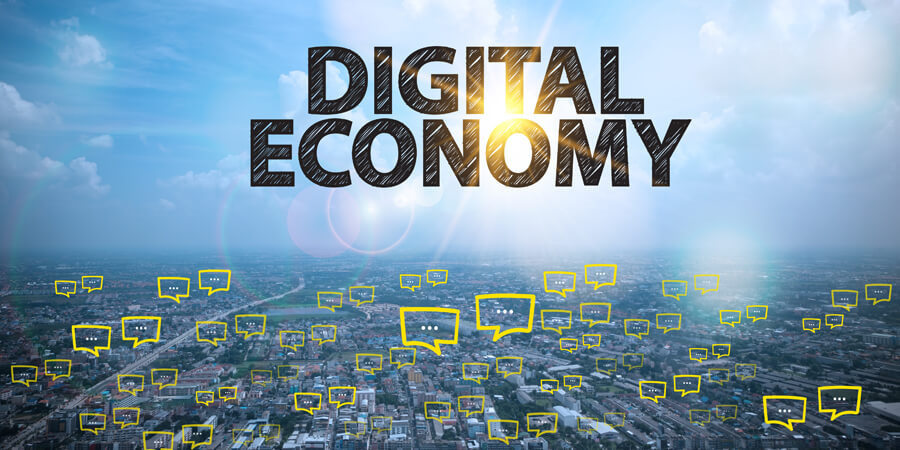As the largest market in ASEAN, with a population of 270 million, Indonesia is also one of the fastest-growing digital economies in the region, promising immense growth potential as tech efforts ramp up exponentially. Contrary to declines across other sectors, Indonesia’s digital economy reported a 4% growth from the preceding year to reach $44 billion in 2020, accounting for more than 4% of the country’s gross domestic product. By 2025, Indonesia’s digital economy is expected to jump threefold to reach $124 billion.
According to the International Monetary Fund (IMF), Indonesia experienced a milder economic contraction compared to neighboring Singapore, Malaysia, Thailand and the Philippines, with its digital economy poised to be a catalyst for economic recovery and growth. This year, the IMF expects Indonesia’s economy to rebound by 4.3%.
Even though Indonesia is still in its early stages of a digital revolution, the country displays promising signs for accelerated digitalization and unlimited opportunities. But for now, the government and businesses are ensuring that digitalization is carried out across key sectors to realize the full potential of this market.
Growing tech hub and start-up market
According to a report from the Economic Research Institute for ASEAN and East Asia, Indonesia boasts the largest e-commerce market in Southeast Asia, with the country recording 4.9 million e-commerce deliveries each day. In a separate report prepared by Temasek, together with Bain and Company, e-commerce will reach $32 billion this year, increasing by 52% from $21 billion last year.
A regional hotbed for investments, Indonesia is also home to a vibrant start-up scene that is increasingly garnering attention from global venture capitalists and tech giants. In the first half of this year, Indonesia’s digital startups attracted $2.8 billion worth of investments across 202 deals, up from $1.8 billion across 123 deals in the first half last year. Some home-grown unicorns include online retailers Bukalapak and Tokopedia, and online ride-hailing app Go-Jek. Given the geopolitical tension between China and the US, tech giants such as Microsoft, Facebook and Google are leaning towards the likes of Bukalapak and Tokopedia to capitalize on the immense growth potential in Asia. Most of the funds are poured into e-commerce, followed by fintech and edtech, testifying to strong investors’ sentiments going forward. Indonesia’s digital economy is also ranked at the top of the country’s most promising investment sources, according to the Indonesia Investment Coordinating Board (BKPM).
A recent opening up of the country’s economy to foreign investment also signals more changes in the coming years, as the nation welcomes influx in foreign equity. For instance, the technology, media and telecommunication sector is no longer subject to a 67% foreign investment restriction as the sector is now open for 100% foreign investment under a regulation that came into effect as of March this year.
Becoming a tech hub
Transforming Indonesia into a tech hub and economic tech powerhouse is a national ambition. Plans are currently underway to develop the country into a tech hub similar to Silicon Valley. Named Algorithm Hill, this 888-hectare megaproject in West Java will be developed into a science and technology industrial zone.
In April this year, Tencent Cloud launched its first data center in Indonesia to tap on the cloud computing potential of the fourth most populous country in the world. Following Google and AWS, Microsoft also announced plans to open its first Azure cloud region. In one of the latest, Princeton Digital Group will be expanding its data center.
On the government’s part, digitalization plans are in full swing with initiatives such as Making Indonesia 4.0, an e-commerce roadmap that includes key sectors such as food and beverages and automotive electronics. Another key agenda is improving connectivity as the pandemic created momentum for improved digital connectivity and coverage, as almost half of the adult population still lacks connectivity in the rural parts of the country.
Indonesia is also tasked to grow its ICT talent pipeline to build a future-ready workforce in a digital age. According to the World Bank, Indonesia is estimated to have a deficient of up to 9 million skilled and semi-skilled tech workers by 2030. Recognizing that digital talent is central to digital transformation, Indonesia has recently launched a Digital Talent Scholarship to train digitally savvy talents. A series of programs has also been launched – one of which involves the private sector supporting through certified tech internship programs.
To support a resilient digital economy, the government will also have to reform regulatory framework to align with quickly-evolving sectors. In particular, policy-makers need to address gaps pertaining to cybersecurity and data privacy and protection to improve consumer trust.
Spearheaded by the government, digitalization will necessarily be the backbone of Indonesia’s economy. Moving forward, there is no doubt that Indonesia’s digital economy will be a bright spark in the region.






